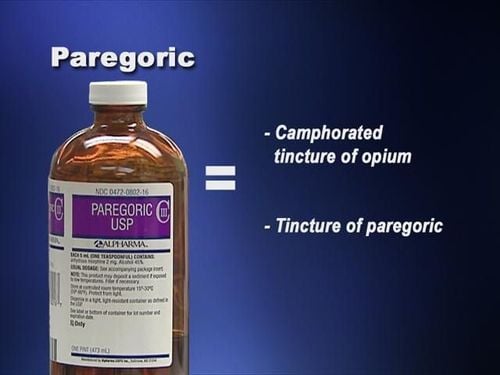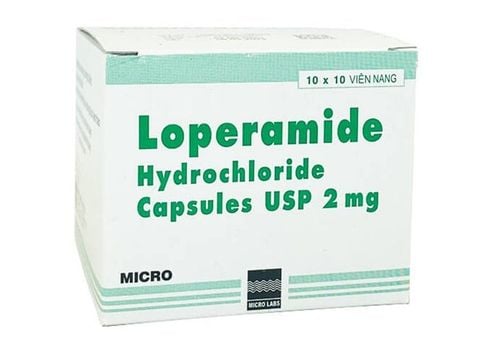This is an automatically translated article.
Loperamide 2mg is a prescription medicine used to treat the symptoms of acute, chronic diarrhea. To ensure effective use and avoid side effects, users need to strictly follow the instructions of the doctor, professional pharmacist.1. What is Loperamide 2mg?
Loperamide 2mg is used in the treatment of diarrhea. The drug should not be used in patients with dysentery (bloody diarrhea).Loperamide 2mg is to be taken with or without food at the dose and time recommended by your doctor. How long you should continue to take this medicine depends on your doctor's recommendations. If you stop treatment too soon, your symptoms may return and your condition may get worse. Tell your doctor about all other medicines you are taking, as some drugs may affect or be affected by this medicine.
Diarrhea can cause dehydration and electrolyte imbalance, so drink plenty of water to help stay hydrated. It is important to avoid taking this medicine if you have blood in your stools or if you are severely constipated.
2. What are the effects of Loperamide 2mg?
Loperamide 2mg is effective for the control and symptomatic relief of acute nonspecific diarrhea and chronic diarrhea associated with inflammatory bowel disease. It is also indicated to reduce the volume of secretions due to vascular occlusion. Loperamide 2mg is used for the symptomatic treatment of acute episodes of diarrhea associated with irritable bowel syndrome in adults 18 years of age and older after the initial diagnosis by a physician.3. Dosage and how to use Loperamide 2mg
3.1. Dosage for Acute Diarrhea Adults: The recommended initial dose is 4 mg, followed by 2 mg after each unformed stool. The daily dose should not exceed 16mg. Clinical improvement is usually observed within 48 hours. Children: In children 2 to 5 years of age, use is not recommended. For ages 6 to 12 use 1 tablet x 2 times/day. 3.2. Pediatric Chronic Diarrhea Dosage: Although Loperamide 2mg has been studied in a small number of children with chronic diarrhea, therapeutic doses for the treatment of chronic diarrhea in children have not been established. Adults: The recommended starting dose is 4 mg, followed by 2 mg after each unformed bowel movement until the diarrhea is controlled, after which the dose should be reduced to meet individual requirements. . Once the optimal daily dose has been established, this amount can then be administered as a single dose or in divided doses. The average daily maintenance dose in clinical trials was 4 to 8 mg. The dose of 16mg is rarely exceeded. If no clinical improvement has been observed after treatment with 16 mg daily for at least 10 days, symptoms are unlikely to be controlled by further administration. This medication may be continued if diarrhea cannot be adequately controlled with diet or specific treatment.
4. Loperamide 2mg side effects
The most common side effects are headache, nausea and constipation. Most of these are temporary and usually resolve with time. The medicine can also cause dizziness, so don't drive or do anything that requires mental focus until you know how this medicine affects you. Avoid drinking alcohol while taking this medicine, as it may worsen your drowsiness. Contact your doctor immediately if you are concerned about any of these side effects:
Watery or bloody diarrhea. Stomach pain or bloating; Diarrhea persists or gets worse; Fast or pounding heartbeat, fluttering in your chest, shortness of breath, and sudden dizziness (as if you might pass out).
5. Contraindications of the drug
Loperamide 2mg is contraindicated in patients with known hypersensitivity to Loperamide hydrochloride or to any of the excipients, or in patients with abdominal pain in the absence of diarrhea. In addition, Loperamide 2mg is not recommended in infants under 24 months of age.
Besides,. Loperamide 2mg should not be used as primary therapy:
In patients with acute dysentery characterized by blood in the stool and high fever. In patients with acute ulcerative colitis, In patients with bacterial enteritis caused by invading organisms including Salmonella, Shigella and Campylobacter, In patients with associated pseudomembranous colitis to the use of broad-spectrum antibiotics.
6. Drug interactions
Loperamide 2mg is a P-glycoprotein substrate. Co-administration of Loperamide (16 mg single dose) with 600 mg single doses of quinidine or ritonavir, both P-glycoprotein inhibitors, resulted in a 2- to 3-fold increase in Loperamide plasma concentrations. Because of the potential for increased central effects when Loperamide is co-administered with quinidine and with ritonavir, caution should be exercised when Loperamide is used at the recommended dose (2 mg, maximum 16 mg daily dose) with P-glycoprotein inhibitors. .
When a 16 mg dose of Loperamide was co-administered with a 600 mg dose of saquinavir, Loperamide reduced saquinavir exposure by 54%, which may be clinically relevant due to reduced therapeutic efficacy of saquinavir. The effect of saquinavir on loperamide is less clinically significant. Therefore, when loperamide is co-administered with saquinavir, the therapeutic effect of saquinavir should be closely monitored.
7. Special warnings and precautions for use
Treatment of diarrhea with Loperamide is only symptomatic. Whenever an underlying cause can be identified, specific treatment should be given when appropriate. The priority in acute diarrhea is to prevent or reverse fluid and electrolyte depletion. This is especially important in young children and frail elderly patients with acute diarrhea. Use of this medication does not preclude the use of appropriate fluid and electrolyte replacement therapy.
Because persistent diarrhea can be a sign of more serious conditions, this medicine should not be used for long periods until the underlying cause of the diarrhea has been investigated.
In case of acute diarrhea, if no clinical improvement is seen within 48 hours, the patient should discontinue use and should consult a physician.
AIDS patients treated with this drug for diarrhea should discontinue treatment at the earliest sign of abdominal distension. There have been separate reports of constipation increasing the risk of toxic megacolon in AIDS patients with viral and bacterial infectious colitis treated with Loperamide.
Although there are no pharmacokinetic data in patients with hepatic impairment, caution should be exercised in these patients because of reduced first-pass metabolism and possible relative overdose leading to neurotoxicity. center.
Patients with rare hereditary problems of galactose intolerance, the Lapp lactase deficiency or glucose-galactose malabsorption should not take this medicine as it contains lactose.
If a patient is taking this medication to control previously diagnosed episodes of irritable bowel syndrome-associated diarrhea and no clinical improvement is seen within 48 hours, Loperamide HCl should be discontinued and consult a doctor. Patients should also see their doctor again if their symptoms change or repeated episodes of diarrhea continue for more than two weeks. Loperamide 2mg is a prescription medicine used to treat the symptoms of acute, chronic diarrhea. To ensure effective use and avoid side effects, users need to strictly follow the instructions of the doctor, professional pharmacist.
Follow Vinmec International General Hospital website to get more health, nutrition and beauty information to protect the health of yourself and your loved ones in your family.
Please dial HOTLINE for more information or register for an appointment HERE. Download MyVinmec app to make appointments faster and to manage your bookings easily.













